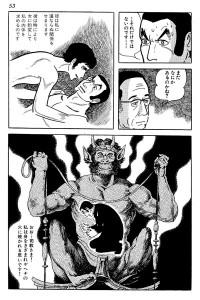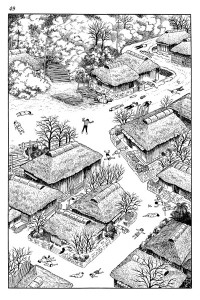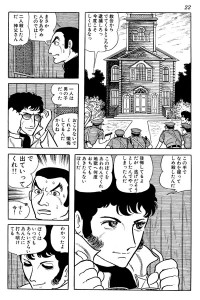MW (Manga)
Also known as ムウ(Mu)
| English Title: | MW |
| In English? | Yes |
| Japanese Title: | ムウ Mu |
| Type: | Ongoing Serial |
| Original run: | 1976/09 – 1978/01 |
| Published in: | Big Comic ビッグコミック |
| Published by: | Shogakukan |
| Volumes: | 3 MT-301 | MT-302 | MT-303 |
Originally serialized in Big Comic from September 1976 to January 1978, MW was created as part of Tezuka’s continued response to the Gekiga movement which opposed the cartoonish nature of Tezuka’s earlier works in both art and storytelling.
What it’s about
From the outside Michio Yuki appears to be nothing more than a charismatic young banker, but his dashing good looks hide the monster that lurks within. In truth he is a kidnapper, extortionist and murderer. A meticulous planner, Michio’s modus operandi is generally to kidnap a carefully selected victim, demand a ransom and, once the payment has been received, kill both the victim of the kidnapping and the victim of the coercion alike. Yet, despite showing no signs of remorse, after committing each crime he seeks out Father Iwao Garai, a Catholic priest, and asks for forgiveness.
This, however, is no act of piety or of contrition. The two men are well known to each other and, in fact, share a complex homosexual relationship. Despite Father Garai’s inner turmoil over the affair, the flesh is weak and he simply finds himself unable to resist Michio’s seduction.
As the story unfolds, the true extent of their relationship becomes clear. The two men are the sole survivors of a poison gas leak that occurred over 15 years ago on a small island near Okinawa. At the time Iwao Garai was a small time thug who had kidnapped Michio as part of a ransom plot. Unable to control his urges, Iwao then raped the under-age boy, just as the islands entire population was accidentally exposed to the experimental poison gas known as “MW” and decimated. Although the incident was covered by the government and the island eventually repopulated, exposure to the gas drove Michio insane.
Now, devoid of any form of morality, Yuki unleashes a complex plot to gain access to the MW gas and use it to wipe out mankind. Meanwhile, Father Garai must battle his own inner demons in order to prevent Yuki’s evil plan from succeeding while he seeks redemption for the sins of his past.
What you should know
Over the course of his career, Tezuka made several attempts to create truly monstrous characters. The first, somewhat tentative attempt came in Vampires (1966-69), where transformed Rock Holmes into his first truly evil villain – as opposed to the self-serving thugs and power mad “bad guys” that had populated his earlier works. However, given Rock’s origins as a “boy detective”, he retained a lot of his boyish charm and charisma which acted as a mitigating factor on his villainy.
In his next attempt, in Alabaster (1970-1971), he stripped away a lot of Rock’s charm and cranked up the evil factor, but the result was unsatisfactory on several levels. Despite the fact that he had managed to outrage Rock’s fanbase, and stretch the tolerance levels of the shonen demographic right to their upper limits, Tezuka still felt constrained. However, since MW (1976-78) was published in Big Comic, a magazine aimed at older men, he faced far fewer restrictions and was thus finally able to develop the character of Michio Yuki as he saw fit.
Even though Michio is portrayed as an amoral monster who is able to commit horrific acts without any regret, he continues the theme of corruption of innocence seen in other Tezuka works such as Ayako (1972-73) and Buddha (1972-83). In fact, when Garai first meets him, he comments that he was “as innocent and lovely as a young girl.” Michio is kidnapped in order to extract a ransom from his wealthy family but through both the trauma of rape and brain damage from inhaling MW, he is turned into a man unable to empathise or feel pity. This, along with the relative normalcy of his brother Tamanojo Kawamoto’s life, allows the reader to use it as a baseline comparison when considering the impact encountering the band of vagabonds, known as “The Crows”, that Iwao Garai was a part of.
MW (1976-78) was written during a time of political instability. Japan, with its intentions as a pacifist power, signed a security treaty with the United States of America which allowed Japanese naval bases to be used during the Vietnam War. This was met by student outrage and led to the formation of a number of radical movements generally opposed to the government and, specifically to the U.S.A. Tezuka’s view on this was that the students were becoming too political, and he makes a direct reference to this in MW (1976-78) by introducing “The Crows” – an idealistic group who end up terrorizing the island and causing great suffering to the residents – into the backstory.
It is also important to note that MW (1976-78) contains a very strong level of sexuality which, while not gratuitous, may cause readers discomfort. This includes heterosexual, homosexual, pedophilic and even bestiality. Rape is also involved in many of these situations. Reading MW (1976-78) is not for the faint of heart.
Finally, as is the case with many of Tezuka’s later, more adult-oriented, works, his Star System cast is kept to a minimum. The one notable exception is Shunsaku Ban who makes an appearance as a barman who assists Father Garai in his struggles.
Where you can get it
In 2007, MW (1976-78) was released as a near 600 page hardcover by Vertical Inc. It was re-released in 2010 as a softcover edition.






